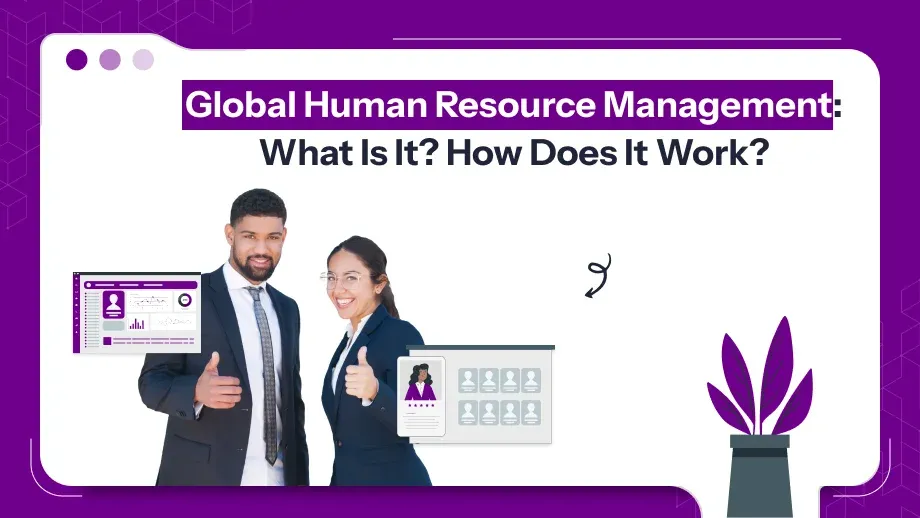
Introduction
Today, operating businesses across this highly interlinked world make managing a global workforce no longer an option but a necessity. Global Human Resource Management refers to the strategic handling of HR activities in different countries while keeping pace with local laws, cultural practices, and overall business goals.
For any company planning international growth, understanding what global human resource management is is crucial. By optimizing workforce management across borders, businesses can attain more efficiency, compliance, and employee satisfaction.
What Is Global Human Resource Management?
In essence, Global Human Resource Management deals with the management of employees from various countries within a single framework. This involves recruitment, performance appraisal, training, payroll, and compliance in addition to taking care of local nuances.
The importance of global human resource management is to ensure that the HR policies and practices reflect the organizational objectives as well as regional differences. Thus, the organization will grow globally while respecting local cultures and laws.
Understanding Global Human Resource Management
Global human resource management is the coordination of a company’s workforce within its different countries, ensuring HR policies and practices are globally aligned with business objectives, but also locally aligned to cultural and legal requirements. Functions include recruitment, training, compensation, performance management, and employee relations, all conducted to manage a diverse workforce that is geographically spread out.
Key Components of Global HRM
Recruitment and Staffing
-
- Global HRM involves sourcing talent globally by leveraging technology and local expertise.
- Balancing local employees and expatriates ensures diversity and knowledge sharing in the workforce.
-
- Tools such as HRMS and Payroll Software simplify recruitment and staffing by automating job postings, tracking the applicants, and onboarding.
Training and Development
- Global training programs provide cross-cultural skills essential for employees working in multicultural environments.
- Regional training is tailored to address local business challenges, making employees more effective in their roles.
- Consistent use of global human resource strategy ensures alignment in employee development across locations.
Compensation and Benefits
- Creating equitable compensation packages that comply with local tax regulations and labor laws.
- Offering competitive benefits customized to meet the needs of employees in different countries.
- Integration with HRMS Payroll Software in India ensures seamless processing and compliance across multiple locations.
Compliance and Legal Frameworks
- Adapting HR practices to regional legal systems, including labor laws, tax codes, and workplace safety standards.
- Ensuring records are maintained for audits and regulatory compliance using advanced hr management tools.
Diversity and Inclusion
- A culturally diverse workplace drives innovation and inclusion.
- Cross-cultural training reduces potential biases through improved understanding among employees working in a multicultural environment.
- A strong global HR strategy focuses on reducing cultural barriers and improving collaboration.
Take your HR skills to the next level!
Global Human Resource Management enables global organizational excellence.
How Does Global Human Resource Management Work?
Strategic Alignment
- Aligns HR policies with the organization’s international business goals.
- Implements a balanced approach between centralized management and local flexibility, ensuring that local regulations and cultures are respected.
Technology in Global HRM
- Using Top HRMS solutions and HRMS tools in India allows HR teams to manage attendance, payroll, and compliance efficiently.
- Data analytics provides insights into global workforce trends, helping managers make informed decisions.
Cultural Integration
- Organizing cultural training programs ensures employees understand and adapt to international work environments.
- Promoting team-building activities across borders strengthens collaboration.
Global Human Resource Planning
- Workforce planning involves assessing future talent needs across regions and identifying skill gaps.
- Predictive analytics, integrated into human resource management system software in India, helps forecast hiring needs globally.
Why Global HRM Matters?
Global HR management forms a backbone for multinational enterprises, enabling them to manage such a diverse workforce effectively across different countries. It ensures the alignment of HR policies and Practices at both the local and global levels with business strategies based on global operations. It is the responsibility of global human resource management – fostering cultural awareness, talent management, and following any applicable legal procedures – to propel organizational success and competitiveness in the global marketplace.
Implementing effective global HR management practices is critical for several compelling reasons:
Access to a Global Talent Pool
Global HRM provides access to a large and diverse pool of talent that has different skills, perspectives, and innovative ideas that may be absent in the local talent base. This diversity fosters creativity and enhances the problem-solving capabilities of the organizations. Strong global human resource planning ensures that organizations develop the right talent to meet needs today and tomorrow.
Facilitating Market Expansion
By strategizing global human resource practices, businesses can easily open themselves up to new international markets. Organizations can adapt nimbly to regional difficulties as well as capitalize on potential international opportunities and sustain future growth in new territories by taking effective control of a global workforce. A comprehensive human resource strategy for the organization will align these efforts towards organizational business objectives.
Promoting Cultural Sensitivity
Cultural differences can either be an obstacle or a door open to opportunity depending on their management. Global HR management emphasizes the understanding and respect of cultural nuances for a work environment that appreciates diversity. This approach boosts employee engagement, satisfaction, and retention through a cohesive and inclusive workforce.
Mitigating Legal Risks
With challenges in global human resource management from legal complexities, it might be a challenge to move. GHRM ensures conformity with the labor laws tax regulations and employment standards within a country, which entails lowering possible legal penalties and reputational damages. This proactive management aids the guarding of operational integrity, thereby instilling trust in stakeholders.
Strategic Alignment with Business Goals
Effective global human resource management aligns HR practices with broader business goals, ensuring that workforce management supports global strategies. A business can streamline operations, enhance productivity, and achieve long-term success on an international level by aligning global human resource planning with organizational goals and implementing a cohesive global human resource strategy.
Benefits of Effective Global HRM
Enhanced Operational Efficiency
- The automation of payroll and compliance functions allows smooth running of operations.
- Tools such as HRMS Payroll Software in India would provide real-time data that lowers administrative overhead.
Employee Satisfaction
- Clear HR policies and personalized development programs would lift the morale of employees with loyalty.
- Self-service HR will enable access to payroll, benefits, and leaves to the employee for ease and convenience.
Better Compliance
- It ensures adherence to international labor laws; the chances of fines and penalties are reduced.
- Regular updates to local compliance requirements are automated within top 10HR software in India.
Talent Retention
- Global HRM strategies focus on identifying and nurturing talent and reducing attrition rates.
- Competitive compensation and benefits packages aligned with local markets help retain top talent.
Competitive Advantage
- A strong global workforce positions the organization as an industry leader.
- Best HRMS solutions streamline HR functions, allowing businesses to focus on strategic growth.
Challenges of Global Human Resource Management
There is the managing of the diverse workforce of employees across various countries with peculiar complications unique to those organizations. Balancing GHRM at once demands the global level in uniformity with that observed in localized aspects proves cumbersome. Indeed, a few challenges facing HR teams during the provision of service are noteworthy: key among the challenges for global human resource management is the management and providing solutions in organizations that include efficiency and compliance issues while delivering such services. End.
Legal and Regulatory Complexities
Every country has its own set of labor laws, tax regulations, and compliance requirements. It becomes a major challenge to tackle these variations in global HR management. In case of non-compliance, penalties may arise and bring damage to the organization’s reputation.
- For instance, managing payroll across regions involves robust systems such as HRMS Payroll Software in India, which automates compliance and ensures accuracy.
- Organizations should be abreast of legal changes and team up with local experts to reduce the risks.
Cultural Differences
Cultural differences are an asset but can also be a challenge if not managed well. Communication, work ethics, and styles may cause misunderstandings that may affect collaboration and productivity.
- Cross-cultural training and awareness programs form part of global human resource planning to address cultural sensitivities.
- A strong emphasis on cultural inclusion enables a conducive working environment and increases staff engagement.
Balancing Global and Local Needs
Striking the right balance between centralized HR policies and localized practices is a constant challenge. While global consistency ensures efficiency, local adaptations are necessary to address unique market and cultural needs.
- A well-crafted global human resource strategy incorporates regional flexibility while maintaining alignment with organizational goals.
- Collaborating with local HR teams ensures that policies meet local standards without compromising global objectives.
Talent Acquisition and Retention
Finding and retaining the best talent can be challenging across various regions. The job markets, pay scales, and employee benefits vary across geographies.
- Organizations need to adopt sophisticated tools like HRMS tools in India to make recruitment and talent pool management easier and track globally.
- Offering competitive compensation packages and career development opportunities tailored to local preferences helps enhance retention rates.
Technological Challenges
Implementing the right technology to manage a global workforce can be overwhelming. Ensuring that tools like human resource management system software in India integrate seamlessly with existing systems across regions is critical.
- Additionally, training employees to use these tools effectively can be time-consuming.
- Investing in scalable, user-friendly systems like Top HRMS ensures smoother adoption and efficient management of global HR processes.
Communication and Collaboration Barriers
Global teams usually face communication issues because of time zone differences, language barriers, and communication styles. Such communication barriers affect decision-making, teamwork, and productivity at large.
- Organizations can overcome this by using collaboration tools and scheduling flexible windows of communication.
- Transparent and frequent communication can be promoted, and thus teams can be aligned in a sense of unity.
Managing Compensation Disparities
Differential scales and benefits in various geographies pose a challenge in maintaining parity while following local market standards.
- A centralized system like HRMS and Payroll Software ensures transparency and consistency in compensation management.
- Regular market analysis helps align global pay structures with regional expectations.
Employee Engagement Across Borders
Keeping the workers engaged and motivated is challenging while handling a geographically dispersed workforce. Cultural differences, distant work setups, and limited face-to-face interactions contribute to this challenge.
- Organizations can respond to this with virtual engagement activities, personalized benefits, and tools for monitoring engagement metrics.
- Incorporating regular feedback loops ensures that employee concerns are addressed proactively.
Compliance with International Data Privacy Laws
Since data about the employees is gathered and processed in many countries, following global data protection regulations, such as GDPR, is quite challenging.
- Organizations must ensure their systems follow data privacy laws everywhere they do business.
- Using secure, compliant systems, such as the best HRMS solutions in place, protects sensitive information about the employees and makes the organization trustworthy.
Conclusion
Global Human Resource Management is quite crucial in helping businesses grow internationally and manage diverse forces of work. By understanding how important human resource management is, organizations can, therefore, align HR practices toward business goals, foster cultural inclusiveness, and ensure compliance across different regions.
Through strategic planning, using advanced tools like HRMS Payroll Software in India, and a commitment to employee development, companies will overcome the challenges of human resource management and sustain their success. The future belongs to businesses that can seamlessly integrate global HR strategies with local practices.









